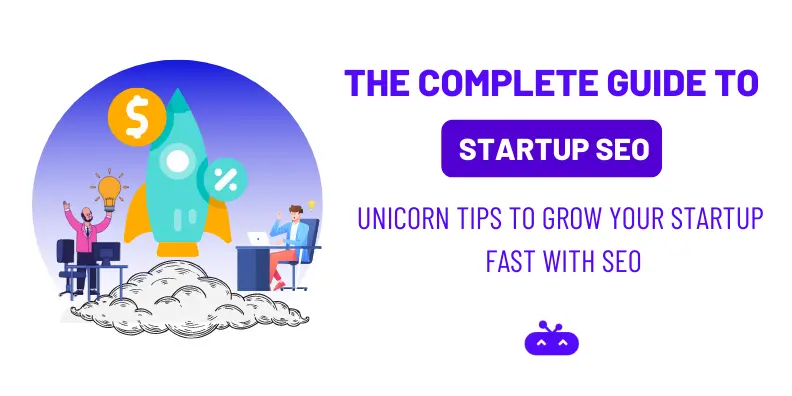What you will learn?
What is a Startup? How does it differ from regular businesses?
As per Wikipedia, a startup or start-up is a company or project undertaken by an entrepreneur to seek, develop, and validate a scalable business model.
The above definition suggests that a Startup is borne out of novel ideas and that’s where it differentiates itself from regular businesses. If there were no element of uniqueness then there would be no reason to call it a startup.
Regular business on the other hand is a business in general. Someone opening a flower shop and selling flowers is a business.
One cannot call that a startup because flower shops have been around for very long. But on the other hand, someone ideating a novel solution that can make lives easier and has never been thought of and can be monetized at the same time then that is what we would call a Startup.
A startup basically solves problems that aren’t solved yet and there is a probability that sufferers would be willing to pay to have their problems solved.
For example, Slack as a startup solved the problems of workplace communication with its versatile communication platform. It was one of a kind when it was introduced.
How can SEO help a Startup grow?
People are searching for solutions to their problems online and at the same time, people are also searching directly to transact with a business or hire or outsource services.
And this is a great opportunity for a startup to make the most out of it.
Being there on Google’s first page when your prospective customer is searching for a solution to a problem will allow your startup to grab some solid leads and customers.
And that is what the role of SEO is for a Startup. This is how SEO helps a Startup.
SEO can help a startup capture searches that are very important to a startup in terms of acquiring new customers and expanding the horizons of the business.
Let’s say your business is having challenges with POS
What’s the first thing you do, you search for the problem on Google
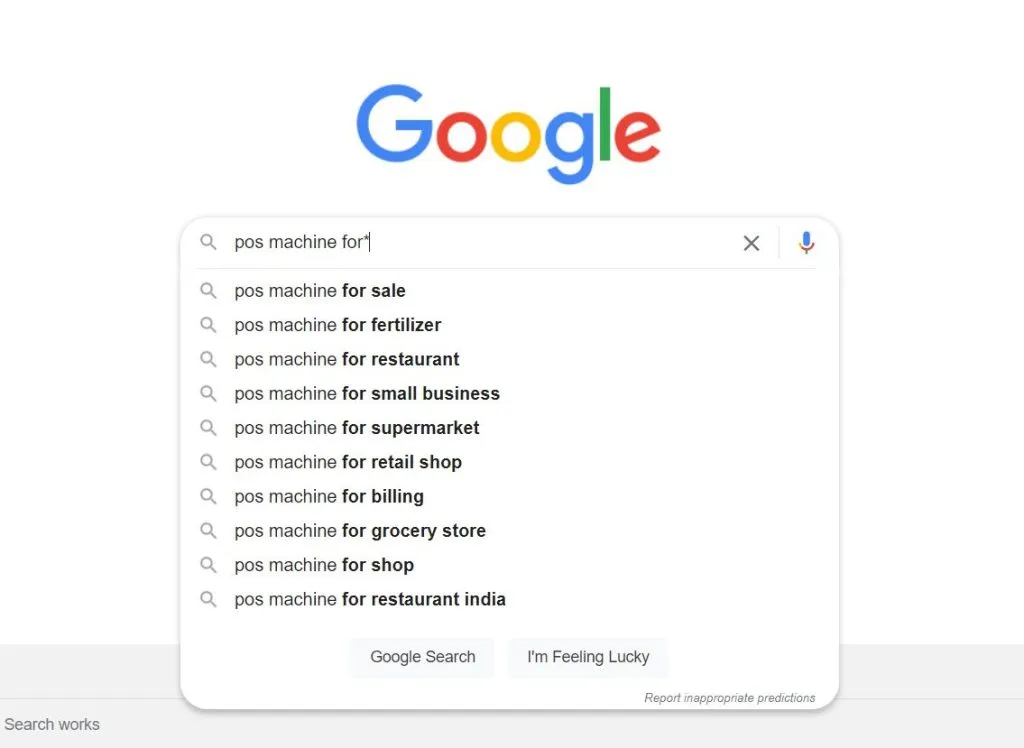
Here are the searches that are already happening around POS. Maybe you are a POS startup that has reinvented the wheel for small businesses.
The prospective searcher searching for “POS machine for small business” is a refined target customer for the startup, and the startup obtained that customer because of investing in SEO.
This is one of the most basic ways SEO helps startups.
Does every Startup need SEO?
It depends!
There are certain startups who are of an innovative kind, they don’t have any search demand as of yet.
But that is not to say that there won’t be any search demand in any foreseeable future, and at the same time, it is also not to say that there would be. It can happen that even in the foreseeable future the demand still isn’t generated or maybe the startup business model died out.
Then there is another instance in which the startup business model isn’t a catalyst; it’s been out there for a long time but has more search demand in other countries but not your country.
Here is an example of search demand for cash flow software in different countries and as we can see here that it has minimal search opportunity in India among other countries.
Whereas, it has the highest search opportunities in the United States and the United Kingdom. (not that we take tool suggested search volume data as gospel, but still it gives a general search-demand estimation)
There can be another instance, let’s say your startup is selling something that doesn’t have search demand in the exact thing that it is selling so you would want to tap in the closely relevant search terms which may be difficult and costly to tap.
And if your startup is running tight on budget then it always makes sense to leverage other platforms that already have the audience and results can be generated without waiting longer and with a reasonable budget.
For example, you have a Hot Dog joint in New Jersey.
You can either try to rank for “hot dog new jersey” which has Semrush Keyword Difficulty “DIFFICULT” battle with News, City Guides, Listing Sites.
or
You can leverage other channels like Google My Business, Social Media Platforms like Instagram, Facebook & TikTok where the audience is already built who you can tap with visual content.
Cutting to the chase, no not every startup needs SEO. But it doesn’t hurt to set up the website for basic business visibility because the website is your real estate on the world wide web. Social media platforms can throw you out for reasons that may now remain unknown.
You might also want to watch Crawling Mondays Discussion on Startup SEO
14 Actionable Steps to Grow a Startup with SEO What you'll learn
- 1. SEO begins during the ideation of the Startup
- 2. Choose a Unique Domain
- 3. Choose a Content Management System/Platform that is flexible to be optimized for search
- 4. Setup measurement for your Startup website
- 5. Keyword Research to validate the search demand from all the possible angles
- 6. Control the Brand SERP
- 7. Insure your startup against competitors
- 8. Have the mindset to invest in SEO
- 9. Increase the Authority of your Startup over the web
- 10. A strategy in place to keep improving User Experience
- 11. Blogging a swiss army knife at a Startup’s disposal
- 12. Not deviating from the Funnel
- 13. Don’t rely only on search engines to drive traffic
- 14. Never stop automating
- The Ultimate Startup SEO Checklist [An INFOGRAPHIC]
- 5 Essential SEO Tools at a Startup’s Disposal
1. SEMrush
2. Screaming Frog
3. Google Search Console
4. Google Analytics
5. OnCrawl
1. SEO begins during the ideation of the Startup
Search Engines are a reservoir that is overflowing with the demand that needs to be fulfilled. When you plan your startup chances are that the startup already has disproportionate search-demand available.
When planning a Startup it is important to factor in SEO, and have active conversations with the SEO team.
The SEO team at this stage can help with performing market research, search demand analysis, competitor analysis, and massive keyword research that coordinates business potential.
It is possible that the data provided by the SEO team can prompt the Startup initiator to make adjustments to the startup to cater to an even bigger audience he/she didn’t know existed.
SEO during the Startup ideation phase helps design the website and information architecture which will later only position the startup to extract more business than they could have otherwise.
If SEO is brought into the fold after the business has been up and running then it is possible that the existing website may not go down well with the SEO team and they may suggest changing the website structure upside down.
This leads to friction between all the teams involved and additional costs are now born because of that.
There is a significant chunk of startups that endure loss and miss out on opportunities because of this one mistake.
2. Choose a Unique Domain
It can’t be stressed enough how important it is to select a unique domain name and how greatly it can pay off in the long run.
And this doesn’t just concern SEO; a unique domain plays a defining role across various channels.
Here are some important benefits that cannot be overlooked
- A unique domain name has its independent identity and can become synonymous with the product. Ex: Canva (there is only one that I can recall)
- A unique domain has the first-mover advantage and will be able to generate close to 100% branded CTR and there will be no doubt as to why people searched for this keyword and arrived at the site.
Not choosing a unique domain can have unexpected troubles, like let’s say there is a brand that’s either exactly the same with a different TLD or is pretty much the same and if that brand lands in bad press; then there is a good chance that your domain also gets confused into being the culprit and can inevitably end up taking some damage.
3. Choose a Content Management System/Platform that is flexible to be optimized for search
This is a very crucial step that needs to be taken in the beginning stages while planning your startup website. Turning back to a different CMS later can cause momentary halts in supplying the demand because CMS migration isn’t a cakewalk.
Your choice of CMS depends on the nature of your business.
WordPress is a widely used CMS that startups around the world use. The key reason why it’s loved so much is that unlike other CMS WordPress is highly customizable and has plugins that can automate a lot of stuff and make your life easier.
But on the other hand, if your startup is an E-commerce startup then you may wanna explore Shopify or Magento as these are more tailored towards eCommerce solutions.
Being a startup owner you want to choose a CMS that has amazing ease of use and makes you less dependent on the tech team.
At the same time, it’s best to stay away from CMS that isn’t popular or has SEO issues that will bug you later.
For example, Wix CMS has been notoriously known for the myriad SEO issues it has which is one of the reasons why SEOs do not recommend going for that CMS and also why it has such a relatively less market share despite such an enormous brand awareness.
As per Wappalyzer’s database, Wix has a market share of just 4.4%
On the other hand, if your startup demands thousands/millions of landing pages, wants to cater to 18-20 countries then it’s best to consider a custom build solution to build your website instead of falling prey to the limitations each CMS comes with.
These are the decisions that need to be made in the very beginning stages of your startup.
We have gone the extra mile by creating flowcharts that will narrow down your decision on the kind of CMS/Platform that you should use for your website depending on the type of your startup.

Is your Startup in the service industry? Do you want to generate qualified leads with your website?
A general choice of CMS when it comes to basic lead generation websites is WordPress but there are certain limitations to even WordPress when you want to grow big when website security is your top priority and you want to tap numerous countries.
WordPress wouldn’t cut through to capture such a wide cast net. Huge startups can easily have the requirement to push lakhs of landing pages and maintain such a huge thing. In circumstances like this, one of the platforms that can maintain such a huge infrastructure is Next.js and you can connect with a headless CMS to make things simpler for yourself.
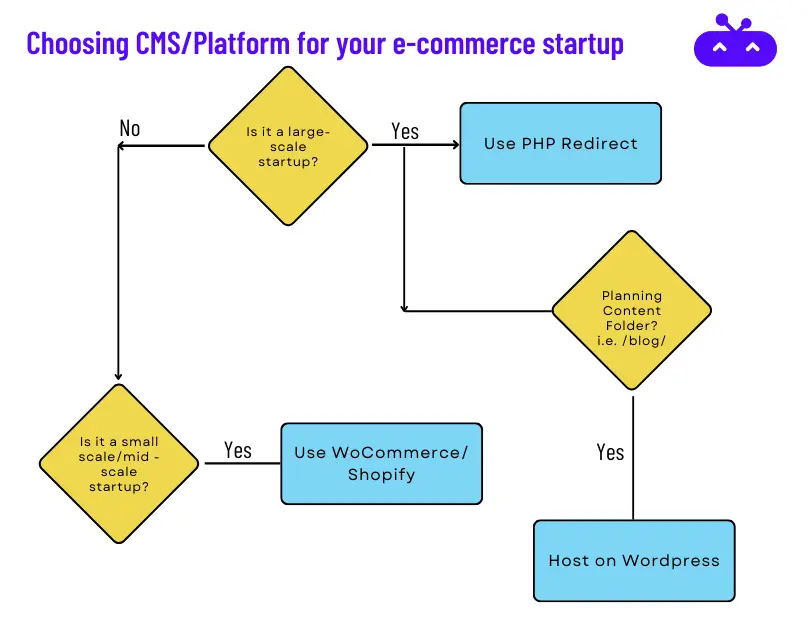
Do you have an e-commerce based Startup? For small to mid-scale eCommerce startups, WooCommerce and Shopify is more than enough. But again, if you want to grow big, be flexible in the way you want the architecture to be, then you may want to consider some other frameworks like Salesforce or PHP.
Building your huge eCommerce platform over these frameworks will give you the much-needed flexibility to do things your way and grow untethered.
For media/content-based startups depending upon the size. For small to medium-sized WordPress is a suitable platform. And if you want to grow huge, then React is an amazing framework that will allow you to do so.
It’s best to make decisions on CMS/Platform predicting the long-term growth plan so that 3 years down the road you don’t have to decide on CMS migration which momentarily halts the SEO growth of your website depending on how you execute it.
4. Setup measurement for your Startup website
Measuring SEO strategy is critical. The more data points you measure the more sure you become about your SEO strategy.
And if the data doesn’t support your strategy then at least that can prompt you to try a different strategy.
SEO strategy measurement can take place in different ways.
And to do that, you need tools; at least the basic ones like Google Analytics & Google Search Console.
Using Google Analytics you need to figure out the following
- Sources of traffic
- Places from where your site gets visitors
- Time they spend
- User journeys
- Click on phone numbers
- Number of people viewing videos and how long
- Are people clicking your CTA’s
- How far are people scrolling your web pages
- How many people are filling the lead generation forms
- Measuring in-store purchases
- Are the items from your header navigation menu getting clicked?
Using Microsoft Clarity you can find
- Heatmaps of pages that show which areas are getting clicked more
- Heatmaps of pages showing how far maximum users are scrolling
- Video recordings on landing pages so that you see their interaction with the landing page in real-time
- Javascript issues
Time to set up various trackings to measure all the critical aspects on your website so that you can take decisions backed by data.
5. Keyword Research to validate the search demand from all the possible angles
Performing keyword research is like asking people if they are in need to solve their problem or just validating if the problem even exists.
When planning SEO, Keyword Research is easily the first step. Keyword research reveals the scale of search demand that already exists in quantifiable terms and that data helps you with planning the information architecture of your website.
You now know what other problems your target customer has which maybe you didn’t know earlier.
For example, you may not know that search demand for your Product exists for certain industries without that knowledge you will create just your product page and optimize it with content to rank #1 and it would.
But you are leaving out the search opportunity on the table by not tapping “for {industry}” keywords.
And this is just one example of what can happen if you don’t conduct exhaustive keyword research to assess the search demand.
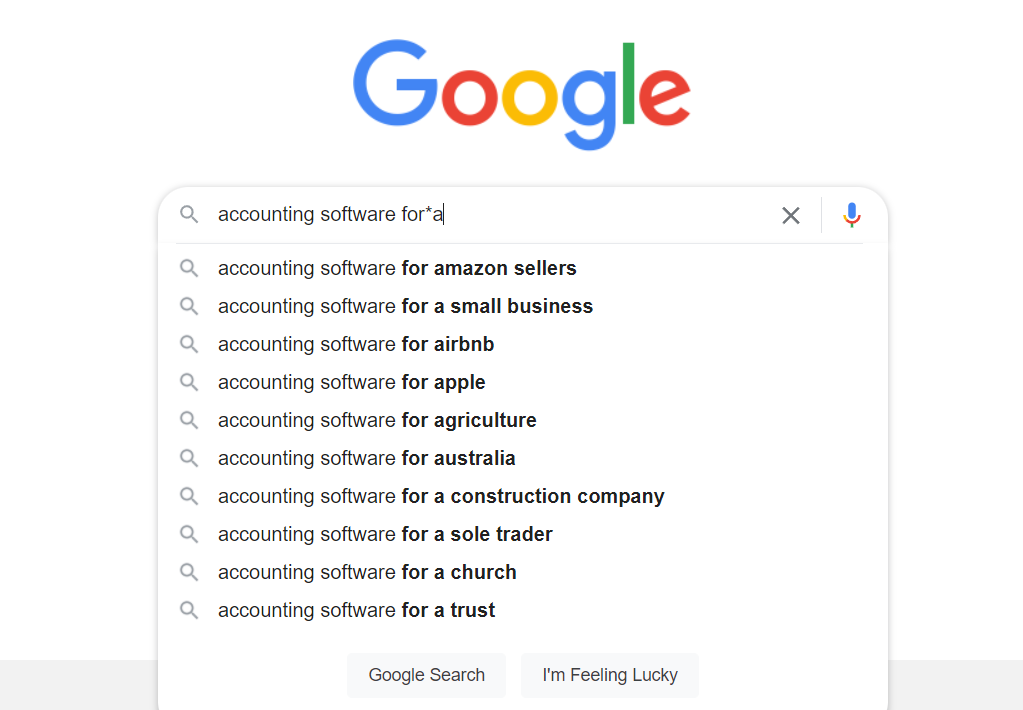
Here is a snapshot from Google auto-suggest that demonstrates the search opportunity that accounting software has in a certain number of industries.
When carrying out keyword research to validate your startup’s search demand it is important to segment keywords by their intent to before-hand find out keywords that will help you generate sales; go a step further and find out long-tail keywords that will help you generate leads if not sales.
Here are keyword intents you should know about
- Informational Intent Keywords:
These keywords are used to find information about something, to learn something. Example – “what are accounting standards” - Navigational Intent Keywords:
These keywords are used to reach a particular website or a particular page.
Example – “nike website”,” where is papa joe’s pizza located” - Transactional Keywords:
These keywords can lead to sales or some kind of transaction. The visitor arriving via these keywords is an educated one who has made up his/her mind about buying something.
Example – “buy red sneakers online”,” insurance quotes” - Commercial Investigation Keywords:
These keywords are searched when the user is in research mode to make the best purchase based on information that he/she finds online. The landing page to which he arrives should best educate about the product/service.
Example – “best black friday deals on shoes”,”laptop ram reviews”
While carrying out keyword research for your startup you have to segment keywords across these intents to find out what kind of conversions and leads your startup can expect via SEO.
If you are finding a wide range of informational intent keywords then that data can prompt you to build your content calendar.
Pro Tip: SEMrush has added a search intent feature in their tool which helps you find intent in less time.

6. Control the Brand SERP
Brand SERPs are neglected quite a lot and they can negatively affect your startup’s reputation or brand visibility if not paid attention to.

Here is Brand SERP visual representation by one and only Jason Barnard; popularly known as the Brand SERP Guy.
The above visual shows what kind of first fold SERP a brand should obtain for its branded searches.
It should have a knowledge panel on the right whether it is Google My Business or Wikipedia scraped knowledge graph, the first ranking page should be your website’s homepage with several site links moving visitors to relevant pages.
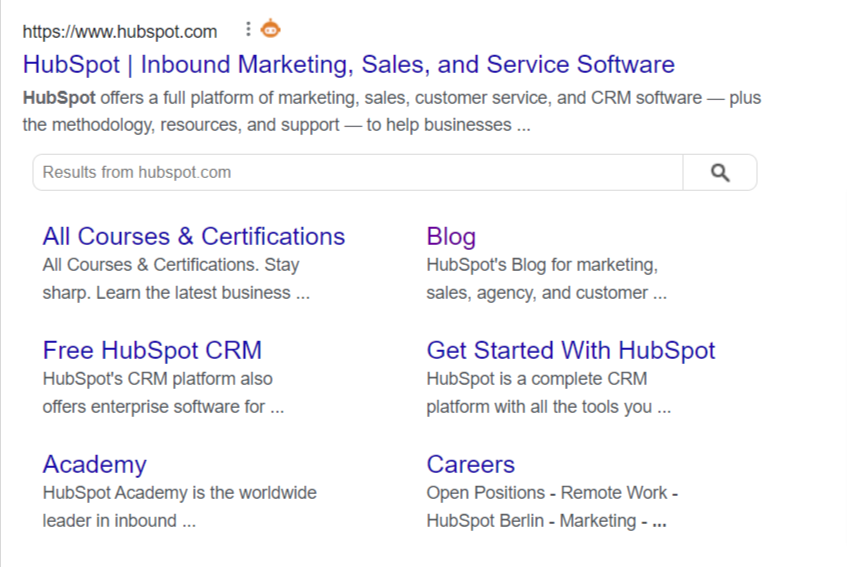
Here in Hubspot’s site links, we can see that they have important pages like Blog, Courses, Getting Started, Academy and Careers.
It’s bad when in the site links we see unimportant pages like pagination for instance.
Beyond that, in the first fold, the brand should have its own Twitter cards.
As we move on to the second fold, it is important to ensure that we have at least 4.5-star ratings in all the business listing sites that are ranking on the first page. Having 1-3 star ratings can affect the reputation of your startup.
Plenty of users arrive at your site via branded searches, and if they are performing branded searches that means that see what’s happening on Google’s first page.
As per SEMrush’s data Apple.com receives 54.2% visits via branded searches.

7. Insure your startup against competitors
SERP battles can land you in a bad position if you aren’t the first one to make the move. This happens more with SaaS/Product based startups.
The idea here is to put out a comparison post against competitors and rank for them justly before they have a chance to do that or bloggers do that and position your startup in a bad light.
This also allows you to grab some additional search opportunities and these are commercial investigation keywords so you can expect to see some lead generation & inquiries taking place.

Here in the above snapshot, you can see how Hubspot has generated content comparing their product to that of competitors so that before competitors/publishers have a chance they obtain the search real estate for the same.

In fact, in the United States alone they have 52 organic keywords in the top 10 for their comparison content against competitors.
8. Have the mindset to invest in SEO
The idea that SEO is free is why lots of businesses and startups fail at SEO.
SEO isn’t free you have to invest in content, and assets to attract traffic. The traffic that you attract after making these investments is free of cost, you do not have to pay for clicks resulting from the SERP.
A scary number of businesses online enter SEO thinking that everything will be accomplished free of charge and in no time the website will begin generating an insane amount of traffic.
But that’s not true. Some investments need to be made in content generation, building assets that will act as link magnets attracting high-quality backlinks for the website, content that will rank and bring traffic to your site.
If there is an unwillingness to invest in SEO then it’s best to not conduct SEO at all. Because completely free of charge SEO can only get you so far (which isn’t that far).
9. Increase the Authority of your Startup over the web
Let’s talk about website authority and not Domain Authority or Domain Rating; these metrics can lead your SEO strategy in areas that won’t correlate with SEO goals & KPIs that you are tracking.
PageRank has been a very important ranking factor on Google, and they always referred to that to determine the ranking on web pages on Google search engine.
PageRank is determined by link building whether it is internal link building or external link building. Essentially Google wants to see web pages on the world wide web that are voting for your web pages by outbound linking to your website.
Now some low-hanging fruit opportunities are easier to grab and are not even shady.
Some of the most basic links that a Startup should obtain are links on important directories & business listings like,
- Google My Business
- Crunchbase
- Trustpilot
- ZoomInfo
- Owler
There are more, if you are an Indian business then getting listed on Yourstory is vital.
As we move on to the next level, then we have Guest Blogging as an effective channel to build some external visibility for your startup.
The focus has to be more on relationship building & building visibility for your brand when indulging with guest blogging. Aggressively fixating on Link Building and acquiring links on exact match keywords can lead to horrible destinations, not to mention that it goes against webmaster guidelines.
Has something exciting happened in your startup? Launched another product? It’s time to publish press releases breaking out the news about the same over relevant Press Release publications.
One of the best strategies for building links in a startup is by creating linkable assets so that the content attracts the link on its own on autopilot.
And this is one of the most legitimate ways of building links that doesn’t land you in trouble.
Once Google sees other sites rooting for yours it naturally finds your site valuable enough to be ranked higher on SERPs once it gets the necessary citation signals, niche signals, category signals.
10. A strategy in place to keep improving User Experience
User experience has been found to play a defining role in SEO. Startups that invest heavily in improving their UX are found to be successful in achieving their SEO goals.
And Google cares about this that is why they have launched the Page Experience Update that measures your site on 3 metrics
- Largest Contentful Paint (LCP)
- First Input Delay (FID)
- Cumulative Layout Shift (CLS)
Google wants people using their search engine to have a remarkable user experience and that cannot happen if Google is ranking websites with terrible user experience.
Tools like Microsoft Clarity and Hotjar help you understand user journeys on your website as you can directly see the session video recordings and heatmap of the page.
Using tools like Google Optimize you can conduct a split test to see which version of the page delivers the most amazing user experience to the users.
User Experience isn’t just about visuals. It is also about convenience, if you are adding way too many fields in your lead generation forms then that is something that can affect your lead generation rates.
Time to set up an A/B test to know for sure which form is generating more leads.
The idea is to tie user experience with business goals and pump the numbers.
11. Blogging a swiss army knife at a Startup’s disposal
Is it even a piece of news that Blogging helps SEO?
Probably not!
Blogging has always played a crucial role in the overall SEO strategy. With Blogging a Startup can tap both informational and commercial intent keywords.
The informational intent keywords can help educate the prospect about the industry, the product, its need, and what its absence can cause.
Then there are commercial intent keywords like we saw with Hubspot doing comparison posts tapping these keywords can lead to lead generation and inquiries.
With a strategic approach to blogging your startup can own a topic altogether every step of the way and build that much-needed brand resonance which will allow connecting the brand with the topic.
For example, NerdWallet is a money management tool that has leveraged blogging/ content marketing to tap topics that their product caters to.
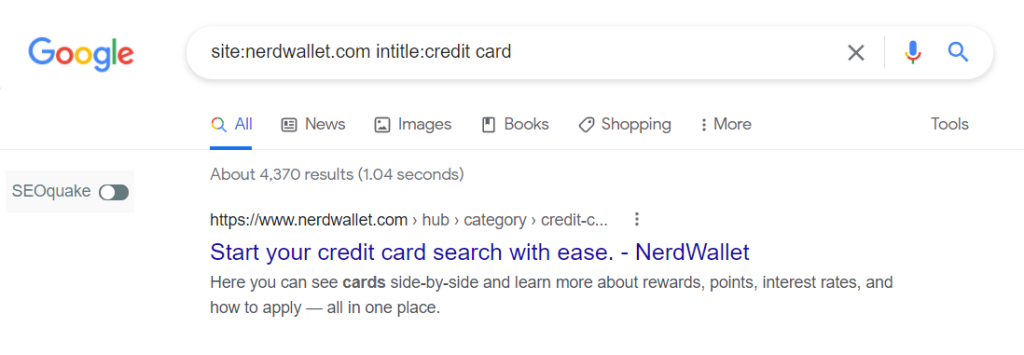
In the above snapshot, we can see that they have 4,370 pages for credit card information.
And it doesn’t just stop here, these blog pages become quite authoritative and attract a lot of natural links.
You can now link from these blog pages to your product page i.e. money pages to improve their rankings so that you generate more revenue ultimately.
Here is a done for you content calendar template that you can start using for your startup blog content

12. Not deviating from the Funnel
Every startup has a funnel, a basic marketing funnel has three types of audiences.
- Top of the funnel Audience
- Middle of the funnel Audience
- Bottom of the funnel Audience
SEO has to work hand in hand to realize the funnel and help the Startup achieve its goal.
And it does play a crucial role in that.
- Information blogs help with generating the top-of-the-funnel audience for the website.
- Blogs on commercial intent keywords like comparisons, best, why consider can help with generating Middle of the funnel audience
- And SEO efforts on product/service pages can help with realizing the bottom of the funnel audiences who are ultimately gonna convert.
Along the way content marketing plays a huge role, you may set a strategy in place to generate visibility on Google Discover which is in many ways an organic retargeting platform.
Traffic generated via blogs can be exposed to subscription pop up which can help with email list building.
The email campaign to those visitors can ultimately help generate leads and close customers.
If you keep the funnel in mind then you will most certainly pay attention to the intents that the SEO strategy is roping in.
For example, it may occur to you that you have been only attracting traffic with informational intent who are coming to solve their problems and leaving after that is done.
This won’t help the business generate revenue. At this point, a parallel strategy can be ideated to attract visitors coming from commercial and transactional keywords.
13. Don’t rely only on search engines to drive traffic
Search engines like Google are key drivers of traffic for a startup website, but startups are of a nature that there are other sources of traffic that they can leverage to attract relevant traffic.
Some of the often neglected sources of traffic are Social Media, Reddit, Quora, HackerNews, ProductHunt launches, Indiehacker, startup listings, and more.
The idea is to promote startups at these places in a way that compels people to click your startup website and find the relevant page. That referral traffic can end up becoming a hot lead for your startup.
14. Never stop automating
Here’s the deal with automation in SEO, the more you automate the menial tasks; the more time you now have to focus on things that would move the needle.
What this means is that now instead of taking 56 hours to accomplish ‘X’ number of tasks; you will now take, let’s say just 36 hours to finish the same tasks.
You have still got 20 hours in which you can adjust the next phase of SEO tasks to expedite the results in a shorter period.
To learn the workings of SEO Automation I highly recommend you check out the resource aggregation by Aleyda Solis. It’s a gem and can help you save countless hours.
SEO automation beyond tools can be something as simple as using Google Sheets formulas like VLOOKUP, CONCATENATE, REGEXMATCH & a bunch of web scraping with IMPORTXML and Andrew Charlton’s Google Sheets scripts.
Believe me, it can save you a ton of time.
Startups have to make do with limited resources at hand, automation like these can help a Startup excel at SEO and get more done with fewer resources at hand.
The Ultimate Startup SEO Checklist [An INFOGRAPHIC]

5 Essential SEO Tools at a Startup’s Disposal
When it comes to making decisions for having SEO tools to manage Startup SEO the idea is to keep things simple.
SEO tools aren’t that affordable; they can add up costs heavily. Hence a thoughtful consideration needs to be made when choosing an SEO tool.
Only get those tools that your Startup cannot survive without i.e. if you are choosing to do in-house SEO instead of outsourcing SEO to an agency.
Here are some SEO tools that every startup needs
1. SEMrush

Semrush is a robust full-fledged SEO tool that will help you with a lot of things. Here are some things that it will help you with.
Here are some of the most important features that SEMrush has to offer
Site Audit:
Using Semrush you can set up your website in the Site Audit and it will take care of monitoring the website health, it will notify you of website technical SEO issues like HTTP Status codes, Core Web Vitals Issues, Internal Linking issues, Structured Data Markup issues and so much more.
Keyword Research:
SEMrush will massively help with carrying out extensive keyword research, you can do bulk keyword research wherein it allows you to get data on 100 keywords at a time. Their keyword research tools have awesome functionality that makes it easier for you to find question keywords, broad match variation keywords.
You can find keywords segment according to the clusters, filtered as per the keyword difficulty (highly reliable). They have added search intent also which makes your job easier and hassle-free.
Position Tracking:
Semrush allows you to track up to 5000 keywords depending upon the plan that you buy. It updates the keyword’s position quite frequently to keep the data fresher. You can track keywords based on device and location, create tags to segment the keywords that you are tracking.
Gap Analysis:
Gap analysis allows you to conduct keyword and backlink gap analysis with competitors so that you can see where you stand among the competitors and where you need to bridge the gap.
These are some of the most amazing features that SEMrush has to offer, there are plenty more but these come on the top.
Want to take SEMrush for a ride?
You’re in luck because instead of 7 days free trial, you can now get a 14-days free trial. The free trial will help you explore various aspects of the tool and how it can help you with SEO. Based on your free trial experience you can take a call whether to go ahead with SEMrush as your choice of Full-stack SEO Tool.
2. Screaming Frog

Screaming Frog is an extremely powerful Technical SEO tool that gives you a birds-eye view of how things are looking at your site. It eCommerceseeingpage views more things can conduct bulk analysis.
Just a glance and you can see the number of pages on your site that has lengthy meta title tags, missing meta title tags, lengthy meta descriptions, missing meta descriptions, duplicate meta tags, missing canonical link element, canonicalized pages, internal linking to non-indexable pages, images missing image alt text.
You can go the extra mile and connect Google Search Console, Google Analytics & Ahrefs API to extract more information about your web pages to perform a detailed analysis.
3. Google Search Console

Google Search Console is a non-negotiable tool that a startup has to use under any circumstance.
This tool gives you first-party data, you are no longer relying on educated guesses by third-party tools.
Here is some of the important data that it provides you
- Keywords for which your website is getting clicks from Google
- Keywords CTR
- URL CTR
- Google Bot Crawlability data
- Core Web Vitals Scores
- Internal Linking
- Coverage > where you find what pages are in the index, what pages are excluded and why
- Mobile usability issues
- Search features your web pages are leveraging
- Breadcrumbs validation
- Schema Validation
- Ability to submit sitemap to Google directly
- Live Test to see the page how Google sees it
Want to dig even deeper? Check out this guide by SEOSLY to learn how you can perform a detailed SEO Audit using Google Search Console alone.
4. Google Analytics

Google Analytics is again the first-party tool at a Startup’s disposal that will provide you with important analytical insights about your site. Some of the key things that you should monitor via Google Analytics for your site are
- Sources of traffic for the site
- Behavior Flow that shows the user journey across the web pages on your site
- Average time spent on page
- Pages/session to see if users are visiting enough pages in their visits
- Average session duration to see how long a session lasts and what you can benchmark
- Ability to track lead generation via Events and Goals
- Ability to track eCommerce conversions like sales
- Ability to track clicks on CTA
- Ability to track clicks on phone number
- Referral traffic insights to see what external backlink activity brings new visitors to the site
- Pages report to see pages with important data like page views, unique pageviews, avg time on page, source/medium
There are more things that can be tracked, but what I have listed above are some of the very important things that a startup should track on their Google Analytics.
5. OnCrawl

OnCrawl is a tool you must use to scale up your Startup SEO game. The tool provides a bird’s eye view of the state of your website. From Technical SEO, On-Page SEO & Backlinks perspective and also how organic traffic is performing.
Go the extra mile and connect GSC, GA, and Log File to gather much more insights.
One of the favorite features of the tool is how it helps with Internal Linking, they have even developed their metric for that. They call it Inrank.
Inrank takes into account Ngrams to determine the flow of PageRank passing through the site.
OnCrawl is a super useful tool for SEO, hands-down. If you are a large-scale startup then it’s an absolute must.

